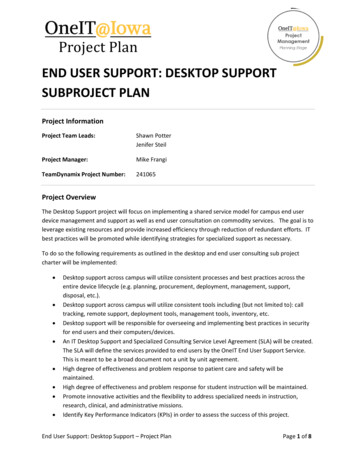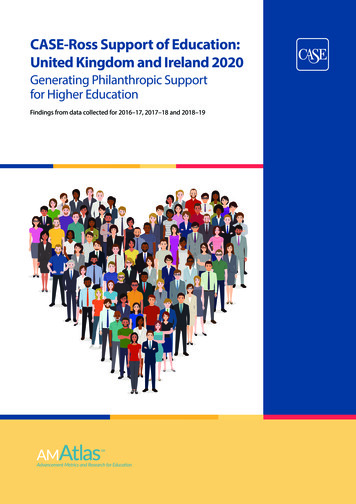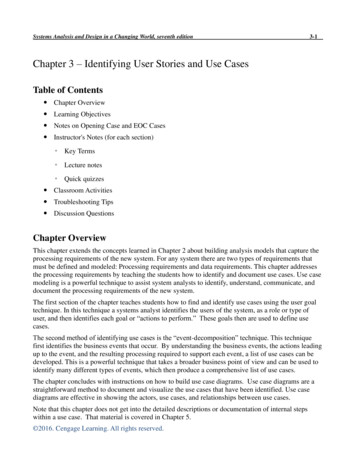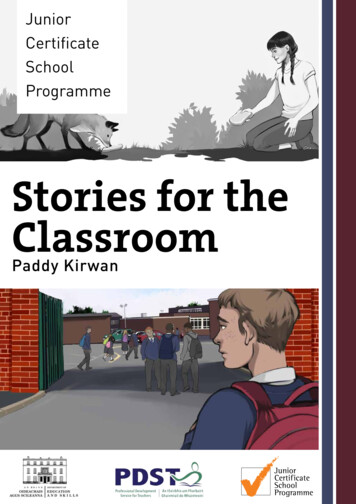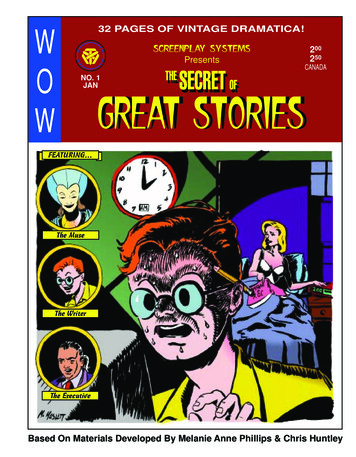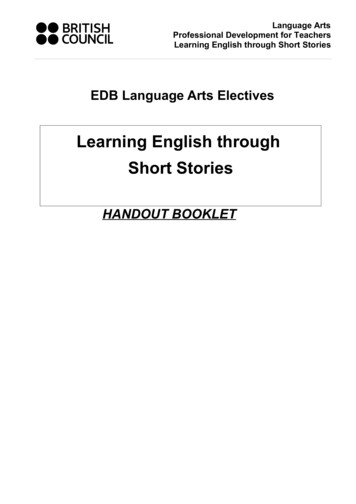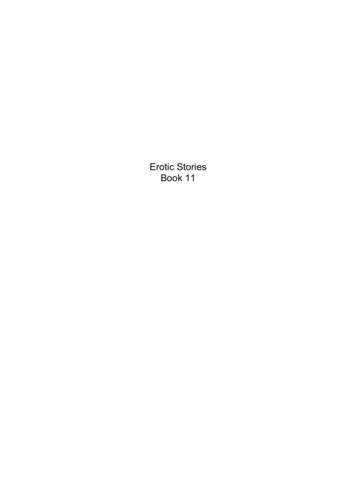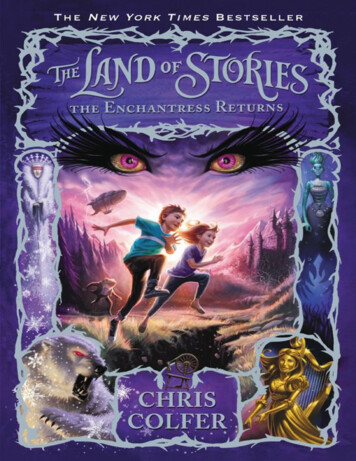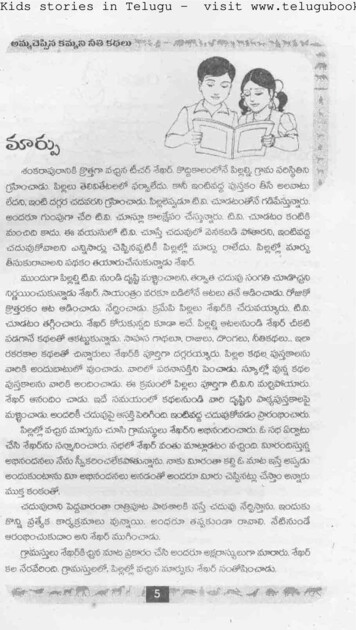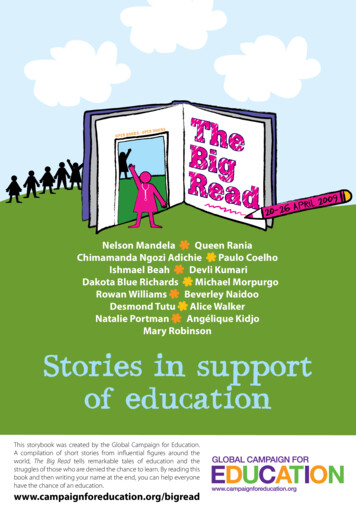
Transcription
sOpen bookors- Open doApril20-26Nelson Mandela F Queen RaniaChimamanda Ngozi Adichie F Paulo CoelhoIshmael Beah F Devli KumariDakota Blue Richards F Michael MorpurgoRowan Williams F Beverley NaidooDesmond Tutu F Alice WalkerNatalie Portman F Angélique KidjoMary RobinsonStories in supportof educationThis storybook was created by the Global Campaign for Education.A compilation of short stories from influential figures around theworld, The Big Read tells remarkable tales of education and thestruggles of those who are denied the chance to learn. By reading thisbook and then writing your name at the end, you can help everyonehave the chance of an education.www.campaignforeducation.org/bigread2009
How you can be part of the Big Read:1. Read or listen to a story from this book2. Write your name on the last page3. S end the message on the last page to yourgovernment4. Let us know you have taken part(either online or using the back of this book)You are taking part in the Big Read with people from all over theworld. This book is being distributed in more than 100 countries.This same book can be read online or downloaded from our website.Sign up here to receive updates on the Big Read around the world:www.campaignforeducation.org/bigreadThe Big Read events are happening throughout the GlobalCampaign for Education’s Action Week, 20th - 26th April 2009. All yournames will be added to this book and delivered to world leaders andthe United Nations. Make sure you add your name by 8th May 2009.20-26April2009
Kailash SatyarthiDear Reader,One in five people around the world cannot dowhat you are doing right now – reading.Close to a billion illiterate people are missingout on more than this great book. They are missingout on an education – and that means the world’spoorest will stay poor. Unable to read or write, theywill be trapped in a lifetime of poverty and willstruggle to survive, to look after their relatives, tofeed their families, and to put their children throughschool. Most of them are women.It’s a simple fact that can be fixed. Everyone canbe given the chance of an education. Nearly everygovernment has promised to provide its citizenswith free and quality education by 2015. Theyhave even agreed how to do it, but sadly these promises are beingbroken. Education is not only a right, but it’s also one of the cheapestinvestments that a government can make.We hope that you enjoy reading one or all of the excellent storiesin this book. Whether it’s Mandela’s speech about the importance ofeducation in South Africa or the short stories written especially for theBig Read by the award-winning author Chimamanda Ngozi Adichieor leading education advocate Queen Rania, there is something foreveryone.Once you’ve finished reading, please write your name at the backof this book, for the millions who cannot. In doing so you’ll be addingyour name to millions of others in demanding that everyone has achance to learn.This year we are campaigning for youth and adult literacy andlifelong learning. We will be delivering the list of names to leadersaround the world and demand that they put the policies and financesin place to enable everyone to have an education, to shape ourpresent and future for generations to come.Let us now make a journey toward ‘Education For All’ together.F President of the Global Campaign for Education
Dakota Blue RichardsDakota Blue Richards was born in London on 11th April 1994. Inprimary school she took weekend drama classes and enjoyed acting,but considered it a hobby and not a career choice.From an early age Dakota read Philip Pullman’s His Dark Materialsseries, and she loved the books, particularly the character of the wildgirl Lyra. When she heard that the books were being made into amovie, she jumped at the chance to audition and won the role ofLyra Belacqua in The Golden Compass. Richards has been nominatedfor several awards including a Critic’s Choice Award. She plans tocontinue acting, but would like to combine it with being a substitute teacher.Ed and his friend CassidyF written and illustrated by Dakota Blue RichardsEd the Stick Insect is a veryspecial Stick Insect. He is aboutas long as a small stick and asfat as a small stick, and Edcan talk.This is Ed Ed likes to watch the childrenthrough the school windowand this is how he taughthimself to read and write. Edloves to read books and learn20-26April2009
things. His favourite book is TheHobbit by J.R.R. Tolkein.Ed’s greatest ambition is to go toschool, but unfortunately, therearen’t schools for Stick Insects. Thisis the story of how Ed achieved hisdream.One day, Ed decided to start aprotest, so he worked very hardand made a sign. Then he went tostand outside the school.But nobody seemed to notice him.Some people nearly squishedhim. Ed decided it was no goodprotesting alone. So he madeanother sign advertising hiscampaign. It said:STICK INSECTS SHOULD GO TOSCHOOL TOO!MEETING - HERE FOUR O’ CLOCKTODAYEd waited but nobody arrived, and
just when he was about to gohome, he heard a voice behindhim. “Hello” said the boy. “Areyou here for the meeting?” saidEd (hopefully). “Yes. My name isCassidy” smiled the boy.From that moment on, Ed andCassidy became the best offriends. They had a lot of funtogether. They played footballin the park. They played ‘fetch’with the dog (although thisgame made Ed a bit nervous).They played hide and seek (thiswas Ed’s favourite).Ed and Cassidy read bookstogether and of course, theyprotested outside the schooltogether. But the teacheralways made Cassidy comeinside and he was forced toleave Ed protesting alone.20-26April2009
Finally, Ed and Cassidydecided that protestingoutside the school was notenough. So they went to seethe Queen.“I completely agree” said theQueen, “Everyone shouldbe allowed to go to school”.So she talked to somevery important people andmade some very importantarrangements. Now Ed goesto school every day, andlearns lots of new things.The most important thing thatEd has learned is that if wework together we can changethe world. The only problemEd has now is that the teacherdoesn’t believe him whenhe tells her the dog ate hishomework!NOW YOU’VE READ THIS, GIVE SOMEONE ELSE THE CHANCEWriteyour name for those who can’tFwww.campaignforeducation.org/bigread(If you can’t get online, use the page at the back of this book)
Chimamanda Ngozi AdichieChimamanda Ngozi Adichie was born in Nigeria. Sheis the author of two novels, Purple Hibiscus, which wonthe Commonwealth Writers Prize and the Hurston/Wright Legacy Award, and Half of a Yellow Sun, which wasnominated for the National Book Critics Circle Award andwon the 2007 Orange Prize. Chimamanda’s fiction hasbeen published in Granta and The New Yorker. She was a2005/2006 Hodder fellow at Princeton University and holds amaster’s degree in African Studies from Yale University.“Chinasa”By Chimamanda Ngozi AdichieIthink it happened in January. I think it was January because the soil was parchedand the dry Harmattan winds had coated my skin and the house and the treeswith yellow dust. But I’m not sure. I know it was in 1968 but it could have beenDecember or February; I was never sure of dates during the war. I am sure, though,that it happened in the morning – the sun was still pleasant, the kind that they sayforms vitamin D on the skin. When I heard the sounds – Boom! Boom! – I wassitting on the verandah of the house I shared with two families, re-reading my worncopy of Camara Laye’s THE AFRICAN CHILD. The owner of the house was a manwho had known my father before the war and, when I arrived after my hometown fell,carrying my battered suitcase, and with nowhere else to go, he gave me a room for freebecause he said my father had been very good to him. The other women in the housegossiped about me, that I used to go to the room of the house owner at night, that itwas the reason I did not pay rent. I was with one of those gossiping women outsidethat morning. She was sitting on the cracked stone steps, nursing her baby. I watchedher for a while, her breast looked like a limp orange that had been sucked of all itsjuices and I wondered if the baby was getting anything at all.When we heard the booming, she immediately gathered her baby up and raninto the house to fetch her other children. Boom! It was like the rumblings of thunder,the kind that spread itself across the sky, the kind that heralded a thunderstorm. Fora moment I stood there and imagined that it was really the thunder. I imagined thatI was back in my father’s house before the war, in the yard, under the cashew tree,20-26April2009
waiting for the rain. My father’s yard was full of fruit trees that I liked to climb eventhough my father teased me and said it was not proper for a young woman, thatmaybe some of the men who wanted to bring him wine would change their mindswhen they heard I behaved like a boy. But my father never made me stop. They say hespoiled me, that I was his favorite and even now some of our relatives say the reason Iam still unmarried is because of my father.Anyway, on that Harmattan morning, the sound grew louder. The women wererunning out with their children. I wanted to run with them, but my legs would notmove. It was not the first time I had heard the sounds, of course, this was two yearsinto the war and my parents had already died in a refugee camp in Uke and my aunthad died in Okija and my grandparents and cousins had died in Abagana whenNkwo market was bombed, a bombing that also blew off the roof of my father’shouse and one that I barely survived. So, by that morning, that dusty Harmattanmorning, I had heard the sounds before.Boom! I felt a slight quiver on the ground I was standing on. Still, I could not getmyself to run. The sound was so loud it made my head throb and I felt as if somebodywas blowing hot custard into my ears. Then I saw huge holes explode on the groundnext to me. I saw smoke and flying bits of wood and glass and metal. I saw dust rise. Idon’t remember much else. Something inside me was so tired that for a few minutes,I wished that the bombs had brought me rest. I don’t know the details of what I did– if I sat down, if I ducked into the farm, if I slumped to the ground. But when thebombing finally stopped, I walked down the street to the crowd gathered around thewounded, and found myself drawn to a body on the ground. A girl, perhaps fifteenyears old. Her arms were a mass of bloody flesh. It was the wrong time for humor butlooking at her with mangled arms, she looked like a caterpillar. Why did I take thatgirl into my room? I don’t know. There had been many bombings before that – wewere in Umuahia and we got the most bombing because we were the capital. Andeven though I helped to clean the wounded, I had never taken anyone into my room.But I took this girl into my room. Her name was Chinasa.)FI nursed Chinasa for weeks. The owner of the house made her crutches from oldwood and even the gossiping women brought her small gifts of ukpaka or roast yam.She was thin, small for her age, as most children were during the war, but she hada way of looking at you straight in the eye, in a forthright but not impolite way, thatmade her seem much older than she was. She pretended she was not in pain when
I cleaned her wounds with home made gin, but I saw the tears in her eyes and I, too,fought tears because this girl on the cusp of womanhood had, because of the war,grown up too quickly. She thanked me often, too often. She said she could not waitto be well enough to help me with the cooking and cleaning. In the evenings, after Ihad fed her some pap, I would sit next to her and read to her. Her arms were still andbandaged but she had the most expressive face and in the flickering naked light ofthe kerosene lamp, she would laugh, smile, sneer, as I read to her. I had lost many ofmy things, running from town to town, but I had always brought some of my booksand reading those books to her brought me a new kind of joy because I saw themfreshly, through Chinasa’s eyes. She began to ask questions, to challenge what someof the characters did in the stories. She asked questions about the war. She asked mequestions about myself.I told her about my parents who had been determined that I would be educated,and who had sent me to a Teachers Training College. I told her how much I hadenjoyed my job as a teacher in Enugu before the war started and how sad I was whenour school was closed down to become a refugee camp. She looked at me with a greatintensity as I spoke. Later, as she was teaching me how to play nchokolo one evening,asking me to move some stones between boxes drawn on the ground, she askedwhether I might teach her how to read. I was startled. It did not occur to me that shecould not read. Now that I think of it, I should not have been so presumptuous. Herpersonal story was familiar: her parents were farmers from Agulu who had scraped tosend her two brothers to the mission school but kept her at home. Perhaps it was herbrightness, her alertness, the great intelligence about the way she watched everything,that had made me forget the reality of where she came from.We began lessons that night. She knew the alphabet because she had lookedat some of her brother’s books, and I was not surprised by how quickly she learned,how hard she worked. By the time we heard, some months later, the rumor that ourgenerals were about to surrender, Chinasa was reading to me from her favorite bookTHE AFRICAN CHILD.)FOn the day the war ended, Chinasa and I joined the gossipy women and otherneighbors down the street. We cried and sang and laughed and danced. For thosewomen crying, theirs were tears of exhaustion and uncertainty and relief. As weremine. But, also, I was crying because I wanted to take Chinasa back with me tomy home, or whatever remained of my home in Enugu; I wanted her to become20-26April2009
the daughter I would never have, to share my life now emptied of loved ones. Butshe hugged me a
Stories in support of education This storybook was created by the Global Campaign for Education. A compilation of short stories from influential figures around the world, The Big Read tells remarkable tales of education and the struggles of those who are denied the chance to learn. By reading this book and then writing your name at the end, you can help everyone have the chance of an education .
